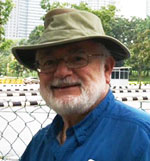By Oliver Pollak

TETON VILLAGE, Wyoming — One Life is a film about the selfless heroism of Nicholas “Nicky” Winton (1909-2015), a self-effacing humanitarian. He directed the rescue of 669 Jewish children in Prague in 1938. The story moves soul searchingly back and forth between the events of 1938 and 1988 when Winton was honored by a BBC television special that brought together, a reunion of sorts, of several hundred rescued children, their children and grandchildren.
Johnny Flynn played the 27 year old Nicholas, Helen Bonham Carter played his pro-active mother, and Anthony Hopkins, aged 87, played the 79 year old Nicholas. The impetus for the
film was the insistence of Nicholas’s wife Grete to downsize the towering banker’s boxes by his desk and in the garage. There’s nothing like saving and contemplating disposing of decades of files and thinking about your legacy.
Nicholas Winton’s family were 1870s German Jewish immigrants to England who anglicized their name from Wertheim to Winton. He took on the active moral burden of rescuing the innocent children from the forces of brutal hate-driven Nazi antisemitism, in the face of apathetic and resistant allied government bureaucracy.
My wife Karen and I dined with dear friends of decades at Gather in Jackson Hole. We did our last minute shopping in preparation for the Passover Seder and decided to pay the $19.95 rental to watch One Life. This is a trigger warning, not a spoiler. This performance will affect your emotions. Keep you Kleenex handy; tearing, crying, and choking up are natural physical
reactions to poignant images. The violence is not overplayed or gratuitous.
The four of us are not your typical American or British focus group. We are older. Two are
immigrants to America and two are second generation survivors. Hitler and The Holocaust have made us human rights watchers. Friday night we observed Kabbalat Shabbat services at Park Avenue Synagogue and Central Synagogue and their Saturday morning services on television.
We followed watching One Life by viewing an episode of The Good Life, a 1974 British
sitcom.
Margit née Littmann Craig (1919-1987), the mother of our dear friend Joyce Craig, our
Wyoming hostess, and the author’s mother Ruth née Bachmann Pollak (1921-2016) lived in
Vienna, Austria and Hannover, Germany. They were both too old to participate in the
Kindertransport. Margit left after the Anschluss in 1938. Quakers facilitated her flight to
Croydon about 12 miles from London.
Ruth was living with her father Felix, a physician and WWI disabled veteran. Like many
cosmopolitan Germans he believed Hitler was a transitory phenomenon and the Germans would come to their senses and vote him out of office. November 8, 1938, Kristallnacht, destroyed that optimism. Ruth planned to go to Shanghai but managed a visa to England. Felix survived Theresienstadt.
Like many young refugee women Margit and Ruth became maids, house keepers and nannies.
The children of the “Czech Kindertransport” were taken in by foster parents and went to school. Most never saw their parents again.
The Passover Haggadah is a timeless form of “Never forget.” Yom Hashoah observance and
Holocaust museums proclaim “Never forget.” The photograph and document scrapbook that
Winton assembled is at Yad Vashem. The Jewish rescue genre, film, non-fiction and novels
grows continually. Steven Spielberg’s Schindler’s List (1993) filled the big screen. Varian Fry
rescued 2,000 to 4,000 Jews, his achievement appears on home screens in Varian’s War (2001) and Transatlantic (2023). One Life illustrates what bravery and persistence can accomplish. It is a must-see viewing.
*
Oliver B. Pollak, Ph.D., J.D., professor emeritus of history at the University of Nebraska at
Omaha, a lawyer, a member of the Institute for Historical Study, and is a correspondent based in Richmond, California.
I thoroughly enjoyed your review of One Life and how you transitioned to Holocaust survivors in your family.
These times of discontent display echoes of the 1930’s fascism. Yes, we have all become human rights watchers.